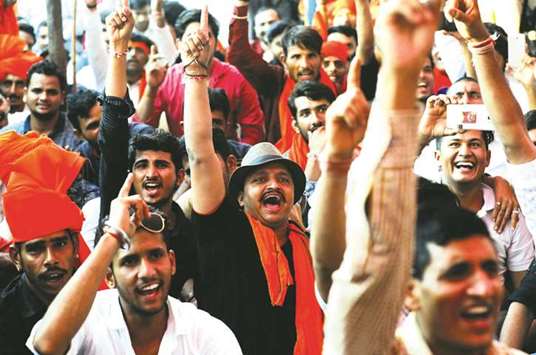The ruling Bharatiya Janata Party yesterday ordered one of its senior members to apologise publicly after he offered a reward for anyone who beheaded Bollywood actress Deepika Padukone, whose portrayal of a Hindu queen in the film Padmavati has enraged Hindu activists.
Padukone, one of Bollywood’s biggest earners, is the lead star of the film which is based on an epic poem.
The film explores the relationship of a Hindu queen from the Rajput warrior clan and Muslim ruler Alauddin Khilji.
The movie was due to open on December1 but its producers postponed the release and Uttar Pradesh and Madhya Pradesh states, both ruled by the BJP, banned it outright.
The party has asked Suraj Pal Amu, a senior member, why he offered Rs100mn ($1.54mn) on the weekend to behead both Padukone and the movie’s director, Sanjay Leela Bhansali.
Members of hardline Hindu fringe groups and the BJP have criticised the film, accusing Bhansali of distorting history.
Bhansali was attacked on set in January by a Rajput organisation.
“We will not tolerate any violent remarks from our party members, but we also want the director to respect India’s history,” said Anil Jain, the head of the BJP’s state unit in Haryana, to which Amu belongs.
He said the party was considering legal action.
Haryana police did not respond to requests for comment.
However Amu yesterday said he stood by his announcement.
He said he gave the statement as a Rajput and not as a leader of the party.
Officials at the Ministry for Information and Broadcasting said Hindu groups and some members of the ruling party had spread rumours about the film, which no members of the public and government had yet seen.
Keshav Prasad Maurya, deputy chief minister of Uttar Pradesh, said he would not permit the movie’s release unless scenes showing the queen in a “poor light” were deleted.
Madhya Pradesh Chief Minister Shivraj Singh Chouhan too announced a ban on the film in his state, while his Punjab counterpart Amarinder Singh backed the Rajput community in its protests.
However, West Bengal Chief Minister Mamata Banerjee described the controversy as “unfortunate” and a “calculated plan” to destroy freedom of expression.
In Jammu and Kashmir, senior National Conference (NC) leader and legislator Devender Rana urged Chief Minister Mehbooba Mufti to ban film in the state.
Also yesterday, over 200 big and small Rajput organisations staged protests and demanded a ban on the film in Mumbai.
“Thousands of Rajputs have come from different parts of Maharashtra and other places to demand a ban on the film. The protests will continue till the community’s demands are met,” said Raj Purohit, a leader of the protesting groups.
“Several speakers demanded that the film must be shown to the community members which is opposing it on certain grounds. Instead, Bhansali thought it fit to show it to a handful of mediapersons which has upset even the Censor Board,” Purohit said.
The Supreme Court yesterday rejected an appeal seeking a ban on Padmavati, saying that it is premature and would amount to prejudging the matter.
The reaction of a bench headed by Chief Justice Dipak Misra came after it was told that the Central Board of Film Certification was yet to clear the film.
“Padmavati has not yet received certification from CBFC. In view of this, our interference will tantamount to prejudging the matter. We don’t intend to do so,” the court said.
In Panaji, CBFC chief Prasoon Joshi said the board was trying to follow a process of dialogue over the stalemate surrounding the film.
Speaking to reporters on the sidelines of the inaugural function of the International Film Festival of India (IFFI) near Panaji, Joshi said: “We are trying to follow processes. Instead of arguments, attempts are being made to have a dialogue on the issue.”
Shahid Kapoor, who has also acted in film, said stopping its release would set a precedent which he would not be “proud” of, adding that he had to suffer a similar ordeal with his earlier film Udta Punjab.
He said a film is made for the entire country and the country should see the film and decide, instead of some people or groups.

Members of the Rajput community chant slogans as they protest against the release of Padmavati in Mumbai yesterday.
